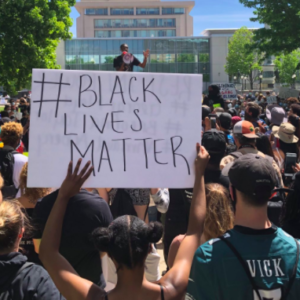The COVID-19 Equity Response Team set up by Gov. Chris Sununu in May has issued its report, which promotes the controversial view that outcomes — and not opinions or intent — determine whether people and policies are racist.
“Ensuring equity in our response to COVID-19 is a priority for the state,” Sununu said when he created the team, tasking them to “develop a recommended strategy and plan to address the disproportionate impacts of the COVID-19 pandemic,” according to a statement from the governor’s office.
Instead, the report goes beyond a strategy to declare “racism is a public health crisis” in New Hampshire. The authors base this accusation on the fact that people of color tend to have lower incomes and higher levels of comorbidities that contribute to more COVID-19 hospitalizations and deaths.
Unsurprisingly, the report calls for tax dollars to be targeted to the minority community.
“Funding sources need to have guidelines reflective of considerations beyond the Eurocentric worldview,” the report reads, urging that CARES Act funds “go into the hands of racial/ethnic minority, especially Black and Brown, organizations, businesses, nonprofits and communities.”
More significant in the long term is the report’s insistence that racism is unrelated to holding racist views or beliefs.
“The argument of ‘intentionality’ is not the main focus of the determination of the existence of racism within any social or political system, it is the ‘outcome’ that is core to dismantling the impact of how these systems are disproportionately disadvantaging some groups while advantaging others,” the report states.
“We have learned it is essential to look not only at access to health care and personal behavior, but also to address the social and political systems that allow racism to exist and disparities to grow. This means going beyond the analysis of individuals within systems who might engage in overt racist behavior or engage in behavior consistent with having implicit bias.”
“The overt manifestations of the bias, discrimination, and racism may not be observed, yet the subtle ways continue to have the same results, disproportionate negative impact on communities of color,” the report said.
This idea, that if a policy impacts black or Hispanic Americans more than other groups it must be racist, is extremely problematic.
For example, part of the motive for bail reform was that black Americans are disproportionately likely to be unable to make bail.
But the net impact of allowing individuals who committed more serious crimes out on the streets has been, as expected, more crime. New York City, one of the first major cities to enact bail reform, experienced an almost immediate spike in crime.
Whatever the reasons — and it could well be a legacy of the damaging impacts of slavery and racial discrimination in the past — black Americans are disproportionately likely to commit serious crimes. As a 2015 report from the Harvard Kennedy School noted:
Between 1980 and 2008, blacks were disproportionately represented as both homicide victims and offenders (Cooper and Smith, 2011). The homicide victimization rate for blacks (27.8 per 100,000) was six times higher than the rate for whites (4.5 per 100,000) (figure 1). Blacks accounted for slightly more than 51 percent of all gun homicide victims between 1980 and 2008, despite representing only about 13 percent of the U.S. population.
Using the “disparate outcome” standard put forward by the Equity Response Team, simply investigating and prosecuting murders is racist. African-American women have the highest rates of obesity or being overweight compared to other groups in the United States. About four out of five African-American women are overweight or obese.
Is obesity racist, too?
According to the CDC, it plays a role in the impact of COVID-19, but it’s only mentioned once in the Equity Response Team’s report. And there’s no mention of the fact that African-American women have the highest rate of obesity in the country.
So is obesity “racist?” Is attempting to address obesity as part of the response to COVID-19 a racist act, or a common-sense healthcare policy.
And what are Americans who are concerned about racist views and opinions support to do with the argument that your views — your “intentionality” — don’t matter? That you can actively oppose racism and still be “racist” by supporting policies like, say, tax cuts, that have a “disparate impact?”
Meanwhile, there are policies supported by Black Lives Matter and their allies that have their own disparate impact on people of color, such as keeping public schools closed and going to remote learning.
A study by McKinsey and Company predicts the average loss of academic ability from remote learning is seven months. “But black students may fall behind by 10.3 months, Hispanic students by 9.2 months, and low-income students by more than a year,” the report found.
Charter schools and private Catholic schools could help prevent this, but progressive activists oppose school choice and are actively trying to shut down the charter school industry.
Twice this year, New Hampshire Democrats on the Fiscal Committee took the unprecedented step of turning down free federal funding because some of the money would go to charter schools.
Is this racism?
Members of the Equity Response Team include Dr. Trinidad Tellez of the New Hampshire Department of Health and Human Services; Nashua Director of Public Health Bobbie Bagley; Dottie Morris from Keene State College; Rogers Johnson of the Seacoast NAACP; and Kirsten Durzy with the Division of Public Health for DHHS.
Asked about the report from his committee, Sununu said, “While our office continues to review their report, we have identified numerous recommendations that are currently either underway or that can prompt immediate action from the state.”
Will that action be based on the report’s premise that you don’t have to be racist to act like a racist?

